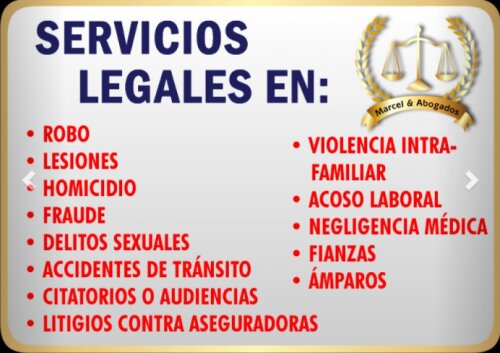Best Child Custody Lawyers in La Paz
Share your needs with us, get contacted by law firms.
Free. Takes 2 min.
Free Guide to Hiring a Family Lawyer
List of the best lawyers in La Paz, Mexico
About Child Custody Law in La Paz, Mexico
Child custody in La Paz, Mexico involves determining who will have legal responsibility for a child, including where the child will live and who will make decisions regarding their upbringing. This can be a complex and emotional issue, and it is important to understand the legal framework surrounding child custody in La Paz.
Why You May Need a Lawyer
You may need a lawyer for child custody issues in La Paz if you are going through a divorce or separation and are unable to come to an agreement with the other parent about custody arrangements. A lawyer can help you navigate the legal process, protect your rights, and advocate for the best interests of the child.
Local Laws Overview
In La Paz, Mexico, child custody laws prioritize the best interests of the child. Factors such as the child's age, relationship with each parent, stability of the home environment, and the child's wishes may all be considered when determining custody arrangements. It is important to be familiar with the laws and regulations specific to child custody in La Paz.
Frequently Asked Questions
1. How is child custody determined in La Paz, Mexico?
Child custody is determined based on the best interests of the child, taking into account factors such as the child's age and relationship with each parent.
2. Can grandparents or other relatives be granted custody?
Under certain circumstances, grandparents or other relatives may be granted custody if it is deemed to be in the best interests of the child.
3. Can custody arrangements be modified?
Yes, custody arrangements can be modified if there is a significant change in circumstances that necessitates a change in the child's living arrangements.
4. What is the difference between legal custody and physical custody?
Legal custody refers to the right to make decisions regarding the child's upbringing, while physical custody refers to where the child will live on a day-to-day basis.
5. How can I enforce a custody order in La Paz, Mexico?
If the other parent is not complying with a custody order, you may need to seek legal assistance to enforce the order through the court system.
6. Can a child express their preference for custody in La Paz?
Depending on the child's age and maturity, their wishes may be taken into consideration when determining custody arrangements.
7. How long does the child custody process typically take in La Paz?
The child custody process can vary depending on the complexity of the case and whether the parents are able to reach an agreement outside of court.
8. What are the rights of non-custodial parents in La Paz?
Non-custodial parents typically have the right to visitation and communication with their child, as well as the right to be involved in major decisions regarding the child's upbringing.
9. Can child support be included in a custody agreement in La Paz?
Child support is typically a separate issue from custody, but it may be addressed as part of a custody agreement to ensure the needs of the child are met.
10. How can I find a qualified child custody lawyer in La Paz?
You can search for child custody lawyers in La Paz through local bar associations, legal directories, or by seeking recommendations from friends or family members who have gone through a similar process.
Additional Resources
For additional resources related to child custody in La Paz, Mexico, you can contact the local family court, the Mexican Bar Association, or organizations such as the National System for Integral Family Development (DIF).
Next Steps
If you are facing child custody issues in La Paz, Mexico and are in need of legal assistance, it is important to consult with a qualified lawyer who is experienced in family law. They can help you understand your rights, navigate the legal process, and advocate for the best interests of your child.
Lawzana helps you find the best lawyers and law firms in La Paz through a curated and pre-screened list of qualified legal professionals. Our platform offers rankings and detailed profiles of attorneys and law firms, allowing you to compare based on practice areas, including Child Custody, experience, and client feedback.
Each profile includes a description of the firm's areas of practice, client reviews, team members and partners, year of establishment, spoken languages, office locations, contact information, social media presence, and any published articles or resources. Most firms on our platform speak English and are experienced in both local and international legal matters.
Get a quote from top-rated law firms in La Paz, Mexico — quickly, securely, and without unnecessary hassle.
Disclaimer:
The information provided on this page is for general informational purposes only and does not constitute legal advice. While we strive to ensure the accuracy and relevance of the content, legal information may change over time, and interpretations of the law can vary. You should always consult with a qualified legal professional for advice specific to your situation.
We disclaim all liability for actions taken or not taken based on the content of this page. If you believe any information is incorrect or outdated, please contact us, and we will review and update it where appropriate.









